The Wild Card in Israel’s War That Threatens a Global Crisis
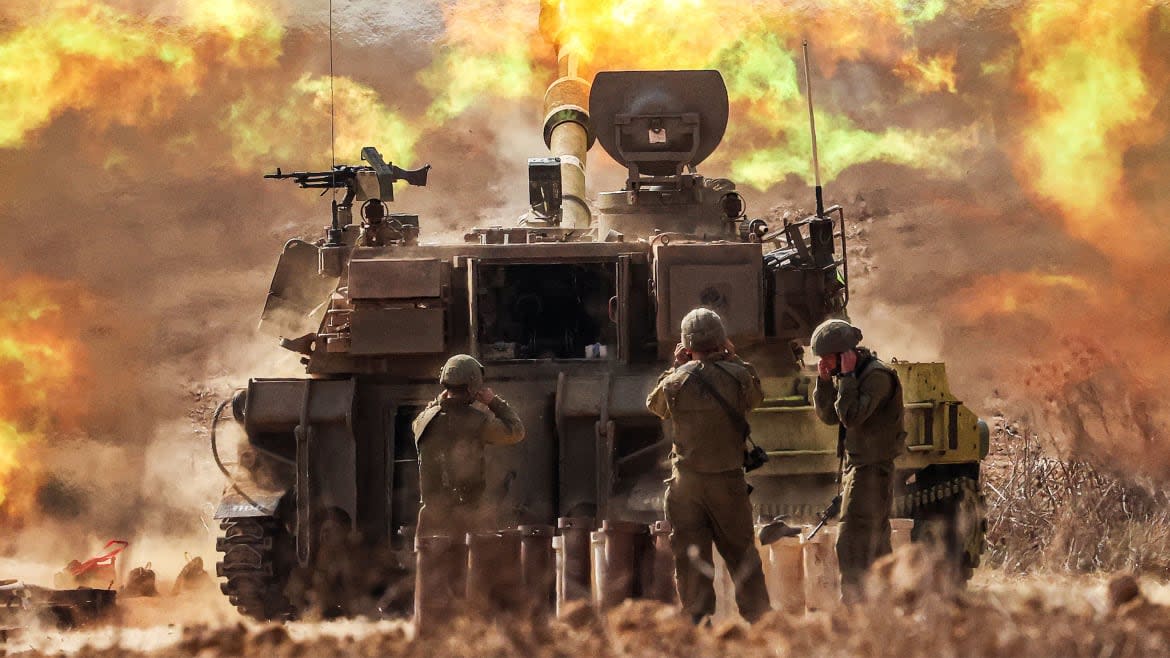
In just the latest clashes that threaten to propel the Israel-Hamas war into a wider conflict, the Iranian-backed militant group Hezbollah launched anti-tank missiles across the Lebanese-Israeli border throughout the day on Friday, prompting Israeli Defense Forces (IDF) to launch strikes against Hezbollah infrastructure.
Earlier this week, two anti-tank missiles reportedly flew into the area adjacent to Kibbutz Yiftah in northern Israel. Israeli forces said they carried out counterattacks targeting the locations from which militants are believed to be launching missiles.
The latest fighting between Israeli and Hezbollah forces come after days of escalating confrontations, raising concern that Israel may soon be facing war on multiple fronts—with both Hamas and Hezbollah in Lebanon. The prospect has raised alarm bells around the world that Israel and its allies, including the United States, could eventually face off in a broader war.
Sporadic armed operations along Israel’s border with Lebanon have been going on for decades. The last time Israel and Lebanon were at war was in 2006—a conflict that lasted a little over a month.
Israel Evacuates Border as Deadly Clashes Raise Fear of Second War Erupting
Although Israeli and U.S. officials have assessed that Hezbollah’s leader, Hassan Nasrallah, does not want to engage in all-out war with Israel, the current level of engagement between Israel and Hezbollah lends itself to miscalculation and misinterpretation—and possible escalation by accident.
With clashes ongoing for the last several weeks, it’s possible that one party’s interpretation of what is one step too far is different than the other, warned Daniel Byman, who previously served as a staff member with the 9/11 Commission and the Joint 9/11 Inquiry Staff of the House and Senate Intelligence Committees.
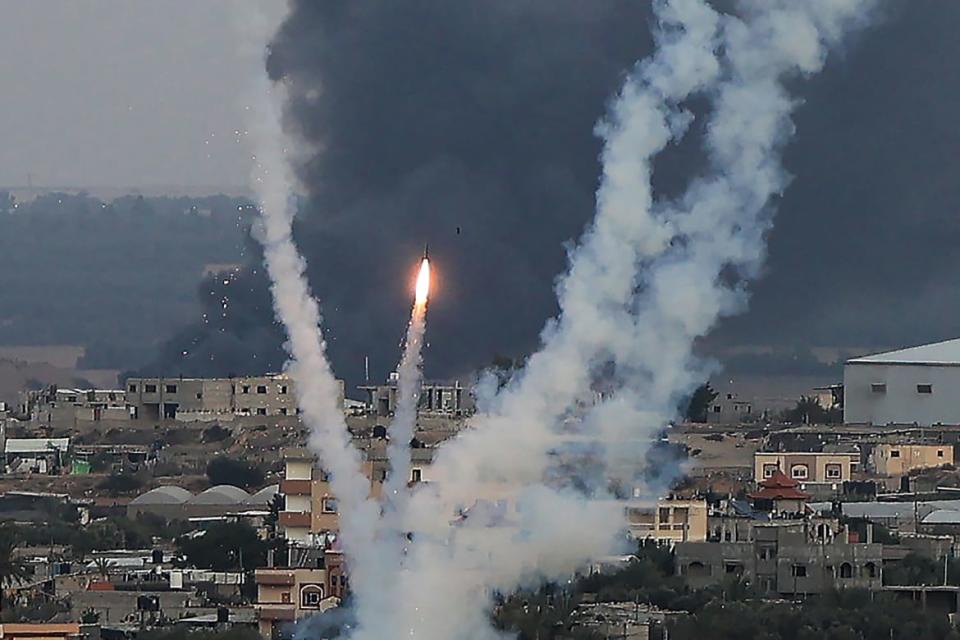
Palestinian militants fire rockets towards Israel from Rafah, southern Gaza Strip, on October 11, 2023.
Another fear is that Israel or Hezbollah might anticipate the other side escalating, and take preemptive action.
“It’s easy for both sides to guess wrong about where the other’s red lines are. So they can think they’re doing an attack that they think is limited, but the other side could interpret it another way,” Byman told The Daily Beast. “It’s also quite possible that both sides will see the other as determined to attack them and decide to launch a preemptive strike.”
And while Israel continues to take steps to try to eliminate Hamas in Gaza, Hamas and Hezbollah have reportedly been working together closely behind the scenes. A senior leader of Hamas, the militant group that attacked Israel on Oct. 7, has said the group was coordinating the war’s next steps with Hezbollah.
“We have very strong relations with Hezbollah. We were cooperating with Hezbollah before the attack on Israel and after and now we are in full cooperation,” Ahmed Abdul-Hadi, Hamas’ chief political officer in Beirut, told Politico in an article published Tuesday.
“They are saying they are geared for a major war.”
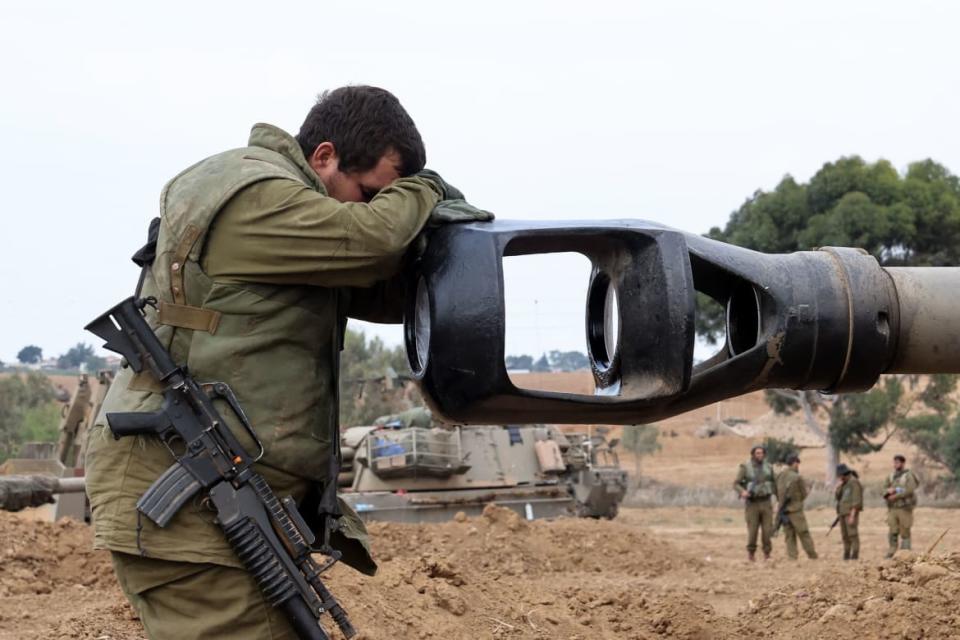
An Israeli soldier rests his head on the gun barrel of a self-propelled artillery howitzer as Israeli soldiers take positions near the border with Gaza in southern Israel on October 9, 2023.
Iran, which has long financed Hezbollah and provided weapons, training, and diplomatic aid to Hezbollah, has been actively working with Hezbollah in recent days as well. Iranian Foreign Minister Hossein Amir-Abdollahian met with Hezbollah’s leader, Nasrallah, in Beirut to discuss the unfolding war in the region.
Iran warned Tuesday that “preemptive” action against Israel might be coming as Israel has made preparations for a ground invasion into Gaza to try to eliminate Hamas.
Risk Assessment
U.S. officials, from President Joe Biden to Secretary of State Tony Blinken have been trying to prevent the Israel-Hamas war from spilling over into neighboring countries. So far, there is some political willpower in place in the region to keep the conflict from spreading, Blinken has said.
“There’s a determination in every country I went to to make sure that this conflict doesn’t spread. President Biden has been very clear about this, and you’ve heard him repeatedly say to anyone, state or non-state, that is thinking of taking advantage of this situation: don’t do it,” Blinken said earlier this week.
The Biden administration is sending two large aircraft carriers—the Gerald R. Ford and the Dwight D. Eisenhower—to the eastern Mediterranean to try to deter any state or non-state aggressors from expanding the war.
Biden’s Big Middle East Summit Nixed After Hospital Massacre
Hezbollah is almost certainly receiving the message, said Emily Harding, a former National Security Council director for Iran. But they have other factors to consider in deciding whether to not to get involved more heavily, Harding warned.
“The bar for Hezbollah and Iran to get involved in this conflict is pretty low, and the bar for the United States is pretty high and they know that,” Harding told The Daily Beast. “I think they’re going to have a moment of pause before they just assume the United States will want to jump into another Middle East conflict, and that’s going to play into their calculation on whether they will be deterred.”
The Biden administration’s efforts to send signals to enemies may actually have some effect, particularly on Iran, said Byman.
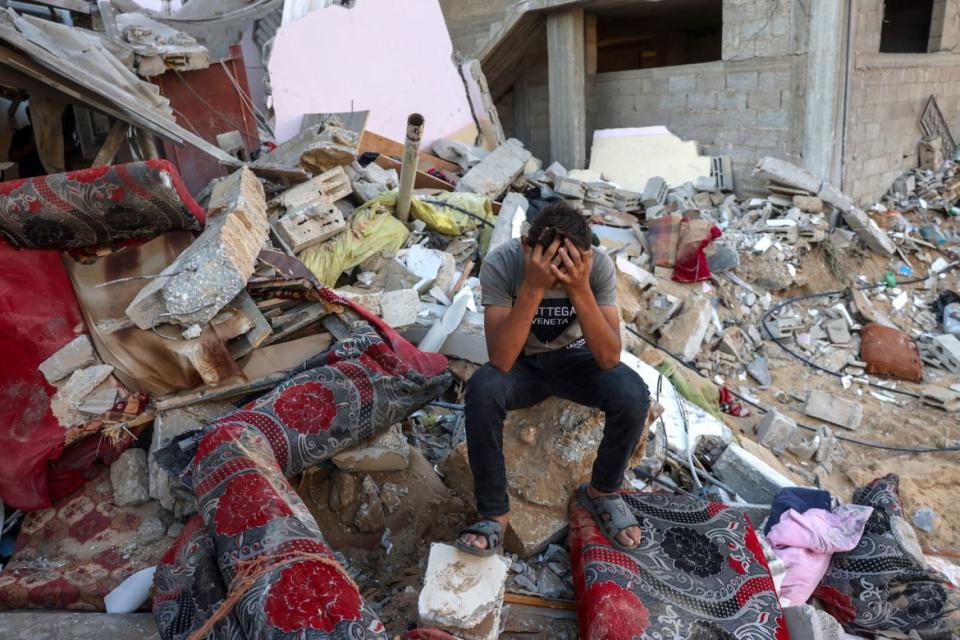
A Palestinian youth reacts as he sits on the rubble of a destroyed home following an Israeli military strike on the Rafah refugee camp, in the southern of Gaza Strip on Octobers 15, 2023, amid the ongoing battles between Israel and the Palestinian Islamist group Hamas.
“Iran has always been leery of a direct clash with the United States. Iran prefers to use proxies,” Byman said. “So having the United States make credible threats, use aircraft carriers to back that up, I think it does matter… it’s part of the decision-making calculus of Iran.”
But even so, the prospect of another front in the war continues to alarm officials. Harding warned against underestimating Hezbollah even given Hezbollah’s potential political calculus.
“As Americans we tend to underestimate the ideological piece of what they do and I think we tend to underestimate their eagerness to get involved in a violent situation,” Harding said. “From their perspective, it’s much more: ‘This is the cause—pushing back against Israel is the cause.’”
Hezbollah may prove to be a more formidable force than Hamas has been, in part because its ranks have been gaining experience through fighting in Syria, Byman warned.
“They’re well armed, they’re experienced, they’re well trained, they’re well led… They have Iranian support,” Byman said, adding they have significant rocket and missile arsenals. “As dangerous as Hamas has proven, I am—and I think most others are—far more concerned about Hezbollah.”
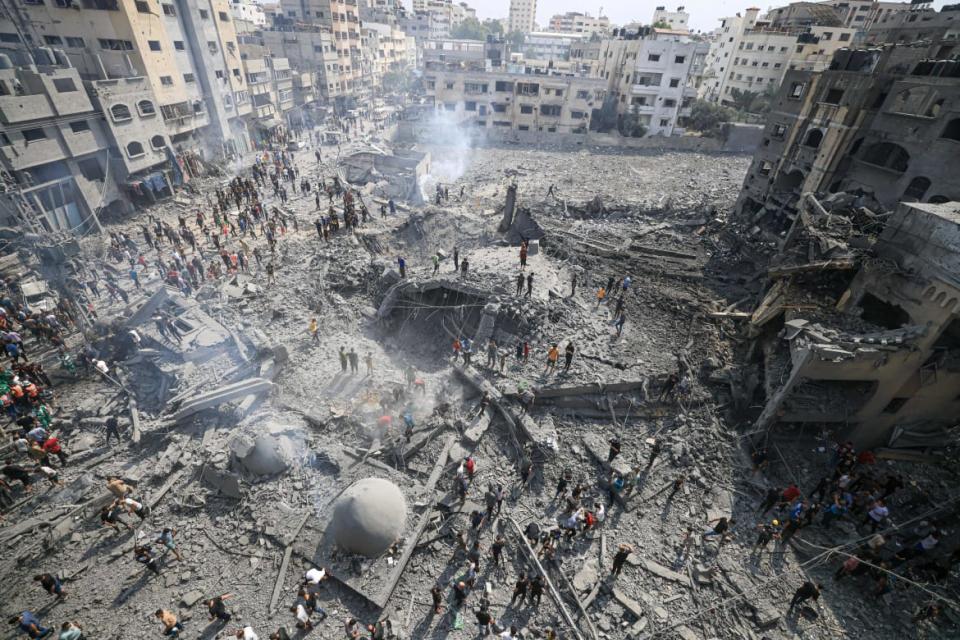
Palestinians inspect the damage following an Israeli airstrike on the Sousi mosque in Gaza City on October 9, 2023.
One concern that is bubbling beneath the surface is that Hezbollah maintains the ability to conduct international terror attacks around the world. The U.S. intelligence community assessed earlier this year that Hezbollah is “committed” to conducting terrorist attacks and that it could do so on U.S. soil.
“Iran and Lebanese Hezbollah remain committed to conducting terrorist attacks and could seek to do so on U.S. soil,” a U.S. intelligence community worldwide threat assessment from earlier this year said, adding that Hezbollah is continue to develop its terrorist capabilities as well as its conventional military capabilities.
Even as Biden has been urging Iran to not escalate tensions and expand the conflict, the White House has been discussing potential use of military force if Hezbollah attacks Israel and expands the war, according to an Axios report.
Publicly, the White House and foreign officials around the globe have cautioned that Iran may still get involved.
“There is a risk of an escalation of this conflict, the opening of a second front in the north and, of course, Iran's involvement,” Jake Sullivan, Biden’s national security adviser, said earlier this week.
Prep Work
Israel appears to have been making preparations as well for a possible wider war.
The country's National Emergency Management Authority (NEMA) of the Ministry of Defense and the IDF announced this week that residents living up to 2 kilometers from the Lebanese border should evacuate. Israel turned the territory near its border with Lebanon into a closed military zone, evacuating residents. On Friday, the Ministry of Defense announced that 20,000 residents of the Kiryat Shmona near the border should evacuate as well.
Some hope remains that Hezbollah has reasons to not engage further in the conflict.
“There are a host of things that are in play that are incentives for Hezbollah to act—it sees itself as an anti-Israel organization,” Byman said. “At the same time, the last war Israel fought with Hezbollah in 2006… Lebanon in particular was hit hard. There’s no eagerness among ordinary Lebanese to have this massive conflict that would occur on their soil.”
“It’s not the only thing that matters, but it does matter to Hezbollah,” Byman said.
U.S. Targeted Across the Mideast in Spate of ‘Revenge for Gaza’ Attacks
Lebanese officials say they want Israel to initiate a ceasefire in order to simmer tensions.
“We have been very afraid, very worried that the war could spread to Lebanon. This is the last thing we want, we have had wars and we're trying have peace in the north and southern Lebanon,” Lebanese Foreign Minister Abdallah Bou Habib said on CNN This Morning Friday. “Really, we don't want war, the government does not want war. We are dialoguing with the various groups…”
Even so, signals are coming from Hamas that Hezbollah’s next steps are tied to whether Israel takes broader action in Gaza.

Hamas' armed wing, the Izz ad-Din al-Qassam Brigades hold a Palestinian flag as they destroy a tank of Israeli forces in Gaza City, Gaza on October 07, 2023.
Hezbollah will likely not pay attention to warnings to not enter into a conflict with Israel, said the senior Hamas leader in Lebanon, Abdul-Hadi. Instead, he said Hezbollah will likely make a decision about fighting Israel more forcefully based on whether Israel launched a ground invasion.
“Hezbollah will pay no attention to threats from anyone against it entering the war; it will ignore warnings to stay out of it,” Abdul-Hadi said. “The timing of when Hezbollah wants to enter the war or not will relate to Israeli escalation and incidents on the ground, and especially if Israel tries to enter Gaza on the ground.”
Israel has not yet launched a ground invasion of Gaza, but has vowed to eliminate Hamas, which governs Gaza. Some reporting suggests that Israel may have delayed a ground invasion while Biden conducts a visit in the region to try to keep the Israel-Hamas war from spilling over into multiple fronts.
But on Thursday, Israel’s defense minister, Yoav Gallant, told troops near Gaza to prepare to “see it from the inside.”
Get the Daily Beast's biggest scoops and scandals delivered right to your inbox. Sign up now.
Stay informed and gain unlimited access to the Daily Beast's unmatched reporting. Subscribe now.


